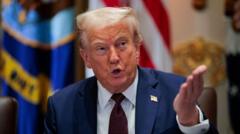Should Trump’s Call for the Death Penalty in DC Murder Cases Spark Controversy?

Published: 2025-08-26 19:07:06 | Category: wales
US President Donald Trump has announced plans to pursue the death penalty for suspected murderers in Washington, DC, arguing it serves as a “preventative” measure against crime. His comments follow the deployment of hundreds of National Guard and federal law enforcement officers to the capital, which Trump described as necessary to combat what he deems "complete and total lawlessness." While the strategy may extend to other cities like Chicago, local officials, including Washington's mayor, Muriel Bowser, have disputed claims of rising crime rates, citing a significant decrease in violence.
Last updated: 30 October 2023 (BST)
- Trump aims to reinstate the death penalty in Washington, DC.
- Local officials dispute claims of rising crime in the capital.
- The death penalty has significant local opposition in DC.
- Federal executions resumed under Trump after a previous moratorium.
- Trump hints at deploying federal troops to other cities experiencing crime issues.
The Context of Trump's Proposal
Trump's proposal to seek the death penalty for murder in Washington, DC, arises amidst a backdrop of heightened tensions around crime rates and public safety. During a cabinet meeting, Trump stated, "If somebody kills somebody in the capital, Washington, DC, we're going to be seeking the death penalty." This announcement has sparked significant debate, particularly given the city's historical aversion to capital punishment.
The Current Crime Landscape in Washington, DC
Washington, DC, has seen fluctuating crime rates over the years, with a notable decrease in violent crime in recent times. Mayor Bowser has highlighted a "30-year violent crime low," contradicting Trump's claims. The local crime rate dropped significantly after a spike in 2023, leading many to question the need for federal intervention.
Legal Framework Surrounding the Death Penalty
The death penalty is a contentious issue in the United States, and its application in Washington, DC, is particularly fraught. In 1972, the Supreme Court nullified the local death penalty, and it was officially repealed by the city council in 1981. A referendum in 2002 saw DC residents overwhelmingly oppose capital punishment, showcasing the local sentiment against it.
Most murders in the capital are prosecuted under local laws, making the implementation of federal death penalties complex. Even if federal prosecutors were to pursue this route, achieving a jury's unanimous agreement would present a significant hurdle, especially in a city where public opinion heavily leans against capital punishment.
Trump's Approach to Capital Punishment
Trump's re-instatement of the federal death penalty was one of his first actions upon taking office in January 2021, reversing the moratorium established by his predecessor, Joe Biden. The executive order signed by Trump describes capital punishment as a crucial tool for deterring heinous crimes. Trump's administration oversaw a flurry of executions during his final months in office, marking a significant departure from longstanding practices surrounding presidential transitions.
Under Trump's oversight, 13 federal executions were carried out, making him the most prolific executioner in over a century. This controversial record has intensified discussions about the morality and effectiveness of capital punishment as a deterrent.
Public Reaction and Political Implications
Public reaction to Trump's comments has been mixed, with many opposing the death penalty on ethical grounds. Critics argue that the death penalty does not effectively deter crime and is disproportionately applied to minority communities. Additionally, legal experts suggest that reinstating it in Washington, DC, could face protracted legal challenges given the city's history with capital punishment and the prevailing public sentiment against it.
Local leaders, including Mayor Bowser, have expressed concerns over the federal intervention in policing and crime control. Bowser has labelled Trump’s assertions as unfounded, insisting that crime rates are declining and that the presence of federal troops may exacerbate tensions rather than alleviate them.
Potential Future Developments
While Trump has expressed interest in extending federal law enforcement efforts to other cities like Chicago and Baltimore, local leaders have pushed back. Illinois Governor JB Pritzker has accused Trump of trying to "manufacture a crisis" to bolster his narrative and political agenda. The implications of Trump's plan could lead to further divisions between federal and local authorities, particularly in cities with Democratic leadership.
What Happens Next?
The future of capital punishment in Washington, DC, as proposed by Trump, remains uncertain. Should the administration attempt to implement these changes, it could lead to a significant legal battle not only in the courts but also in public opinion. The administration may also face challenges in mobilising widespread support for such a controversial measure.
Furthermore, ongoing discussions around crime, policing, and public safety are likely to persist as critical issues leading into future elections. As debates continue, the effectiveness of federal interventions in local crime rates will also come under scrutiny.
Conclusion
Trump's proposal to seek the death penalty in Washington, DC, highlights a complex intersection of law, public safety, and political strategy. As crime rates fluctuate and public perceptions evolve, the conversation around capital punishment will undoubtedly remain contentious. How this proposal plays out in the coming months will be crucial in shaping the future landscape of crime and punishment in the United States.
As political leaders navigate these challenges, the effectiveness and morality of capital punishment will continue to be a pivotal topic in American society. What changes might we see in local crime policies, and how will public sentiment shape the future of capital punishment? #DeathPenalty #CrimePolicy #PublicSafety
FAQs
What is the current status of the death penalty in Washington, DC?
The death penalty has been nullified in Washington, DC, since 1972 and was officially repealed by the city council in 1981, with local residents opposing its reinstatement in a 2002 referendum.
What are the arguments for and against the death penalty?
Proponents argue the death penalty deters crime and serves as justice for heinous acts, while opponents contend it is ineffective, costly, and disproportionately affects minority communities.
How has Trump's stance on the death penalty changed since taking office?
Trump reinstated the federal death penalty through an executive order on his first day in office, reversing a moratorium established under Joe Biden and overseeing multiple federal executions during his presidency.
What impact could Trump's proposal have on local crime rates?
The impact of reinstating the death penalty on local crime rates is uncertain, with many experts suggesting it may not effectively deter crime. Additionally, local leaders have raised concerns over federal intervention in policing.
What is the public opinion on capital punishment in the US?
Public opinion on capital punishment in the US is divided, with significant opposition in urban areas like Washington, DC, where residents have historically voted against it.



